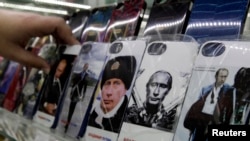Russia is kicking off a national campaign to ramp up morale ahead of Victory Day, that allows citizens to download patriotic war songs for free ringtones and express their national pride with their mobile devices.
The drive comes as Russia suffers a recession spurred by low oil prices and sanctions imposed by the West for the conflict in Ukraine, while Russian officials and media spread conspiracies that the West wants to destroy Russia and steal its resources.
It started Monday as Russia marked an official holiday known as "Defender of the Fatherland Day" honoring the country's armed forces.
The holiday dates back to the years immediately following the Bolsheviks' seizure of power in Russia in 1917, when it was called "Red Army Day." Following the collapse of the Soviet Union in 1991, it was renamed "Defender of the Fatherland Day."
Perhaps not coincidentally, Monday also saw the kickoff in Russia of nationwide campaign called "Hooray for Victory," which will lead up to this year's "Victory Day" on May 9, marking the 70th anniversary of the end of what is known in Russia as "the Great Patriotic War" - aka World War II.
As part of that campaign, the organizing committee for this year's "Victory Day" commemoration announced Monday that Russian cellphone users can dial the number "1945" and, at no additional cost, download one of the melodies from five well-known songs of the Great Patriotic War years - "Dark is the Night", "Farewell of Slavianka", "Victory Day", "Katyusha" and "Blue Scarf" - for use as their ringtone.
The Russian government newspaper Rossiiskaya Gazeta reported that visitors to the May 9 organizing committee's website will be able to listen to wartime news reports by the Soviet Information Bureau, the news agency set up in 1941, "get acquainted with archival photographs and newsreels of the Great Patriotic War, vote for the best Victory song, [and] watch [their] favorite movies about the war."
Meanwhile, President Vladimir Putin marked Defender of the Fatherland Day by laying a wreath Monday at the Tomb of the Unknown Soldier in Moscow.
Since the start of the conflict with Ukraine last year - which has seen Russia annex the Crimean peninsula and give backing to armed separatists in eastern Ukraine, with the United States and its European allies imposing sanctions in response - Russian state media and officials have hearkened back to war years when commenting on the conflict. They have frequently portrayed it as part of a fight against rising "fascism" among some of Russia's neighbors.
For example, one of President Putin's top security advisers, Nikolai Patrushev, alleged earlier this month that what he called the "rebirth of Nazism in the Baltics and Ukraine" is occurring with "the connivance of Europe and even the incitement of the U.S."
Putin, for his part, has emphasized the key role Soviet forces played in defeating Nazi Germany.
In a speech last month marking the 70th anniversary of the liberation of the Auschwitz concentration camp by the Soviet Army, the Russian president said that "Russians bore the brunt of the battle against Nazism" and praised the "heroic feat of the Red Army officers and men who defeated Nazism."
In that same speech, Putin also accused pro-Nazi forces in Ukraine and the Baltic states of having collaborated with Nazi Germany in carrying out the Holocaust.
It is against this backdrop that the Russian president will preside over the events commemorating the 70th anniversary of Victory Day on May 9, including a military parade.
Russian Deputy Prime Minister Dmitry Rogozin told a group of war veterans Monday that the military parade this May 9 will feature "only the most sophisticated military hardware," adding that "today we have the enemy at the gate."





